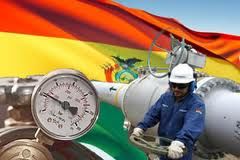
(above) The administration of Evo Morales has yet to reply to the report leaked to the press
Controversy in Bolivia about the country's proven gas reserves
October 25, 2010 - MercoPress.com
According to a recent audit commissioned by the Bolivian government and conducted by US-based consulting firm Ryder Scott allegedly shows that the country has only 8.3 trillion cubic feet of proven gas reserves, sharply lower than the range of 12.8 trillion to 26.7 trillion that has appeared in contradictory official versions.
"It's a blow to the expectations that have been built up since the start of the decade concerning ... (factors) that gave Bolivia an economic advantage in the regional context," energy sector analyst Hugo del Granado is quoted in La Paz press.
Del Granado caused a stir days ago when he published an article about a preliminary yet reliable report he had seen concerning a sharp drop in proven gas reserves, noting the government has been keeping the information secret since June.
Apparently the recent audit commissioned by the government and conducted by U.S.-based consulting firm Ryder Scott shows that Bolivia has only 8.3 trillion cubic feet of proven gas reserves, sharply lower than the range of 12.8 trillion to 26.7 trillion that has appeared in contradictory official versions.
Bolivia is "resisting the truth" because acknowledging the reality would mean losing its status as the second-leading natural gas power in South America, Del Granado said, adding that the country currently ranks fourth in the region in terms of proven reserves.
Venezuela has 200 trillion cubic feet of gas reserves, followed by Argentina, with 13.2 trillion; Brazil, 12.7 trillion; Peru, 11.2 trillion cubic feet; and Colombia, 4.4 trillion, according to figures cited by the expert.
Bolivia's former superintendent of oil and gas, Carlos Miranda, told the media that, if the drop in reserves is officially confirmed, Bolivia would be faced with "the nation's biggest-ever natural resources disaster."
The Hydrocarbons Ministry has not confirmed or denied Del Granado's information, but it said authorities are conducting an "exhaustive review" of the Ryder Scott report.
The ministry said in justifying the country's fluctuating reserve figures that the previous consulting firm, DeGolyer & MacNaughton, had "magically" inflated the data when the sector was dominated by private companies, before later reducing them after President Evo Morales' government asserted state control over the sector in 2006.
Bolivia broke its contract with DeGolyer and MacNaughton after the firm reported that year that, due to a change in its methodology, the country's proven reserves had fallen from 26.7 trillion cubic feet to 12.8 trillion, without providing a detailed explanation for the decline.
Bolivia's current annual output of natural gas is 500 billion cubic feet, which supplies both the domestic market and Bolivia's neighbours Brazil and Argentina.